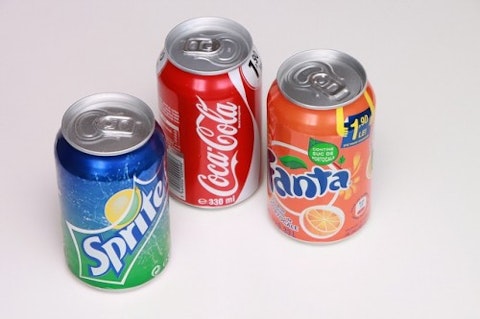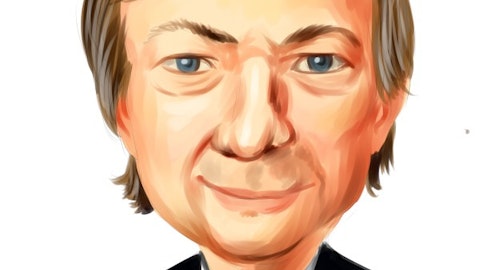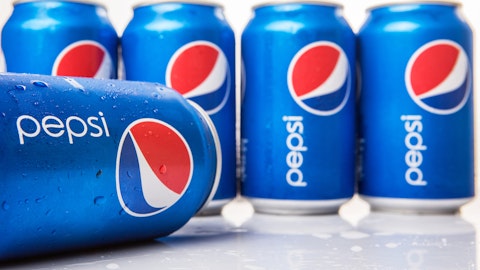Eternal rivals PepsiCo, Inc. (NYSE:PEP) and The Coca-Cola Co (NYSE:KO) have recently engaged in another fight, as both companies are looking to diversify their portfolios into the fast-growing healthy lifestyle segment. Reports have emerged about both companies holding talks to invest in Chobani LLC, a producer of yogurt. Let’s take a look at why the two beverage giants are interested in a yogurt company and which of the two hedge funds like best.

But why do we track hedge fund activity? From one point of view we can argue that hedge funds are consistently underperforming when it comes to net returns over the last three years, when compared to the S&P 500. But that doesn’t mean that we should completely neglect their activity. There are various reasons behind the low hedge fund returns. Our research indicated that hedge funds’ long positions actually beat the market. In our back-tests covering the 1999-2012 period hedge funds’ top small-cap stocks edged the S&P 500 Index by double digits annually. The 15 most popular small-cap stock picks among hedge funds also bested passive index funds by around 53 percentage points over the 37-month period beginning from September 2012 (read more details here).
The soft drinks market has been shrinking for some time now and, with consumers replacing sugary drinks with sports drinks and carbonated water, a potential rebound of the sector is not expected anytime soon. Both Pepsi and Coca-Cola have been diversifying their portfolio into other sectors and Chobani is their latest target. According to people familiar with the matter cited by Reuters, the Greek yogurt maker is looking to sell a minority stake of up to 20%, including debt, hoping the deal would valuate the company at $3 billion. Chobani is also planning to offload some warrants held by TPG Capital LP, a private equity firm that has loaned the company $750 million last year to support its turnaround efforts.
Although both soft drinks giants have been busy expanding in other lucrative sectors, especially snacks market, PepsiCo, Inc. (NYSE:PEP) can boast a larger portfolio. Both companies have some experience in the dairy sector as well, with The Coca-Cola Co (NYSE:KO) having established a joint venture with Select Milk Producers for the distribution of FairLife, a milk product, while PepsiCo has teamed up with German dairy company Theo Müller to enter the yogurt business. With Chinese and emerging markets in a slump, both beverage companies are looking for investment opportunities on the U.S. soil to reduce exposure to foreign market and currency fluctuations.
On the next page, we will discuss recent financial results of the two soft drink companies and which one hedge funds like best.
The Coca-Cola Co (NYSE:KO) has lost some of its appeal during the second quarter, as the number of funds invested in the company has decreased to 62, from 65, while the value of their investment dropped by 10% to $19.5 billion. According to our database, their combined holdings accounted for 11.4% of the company’s common stock at the end of June. Coca-Cola’s biggest fan is none other than the legendary Warren Buffett. Berkshire Hathaway reportedly holds 400 million shares of the beverage company, which also make it Buffett’s second largest equity position. Donald Yacktman, the manager of Yacktman Asset Management, also holds a significant stake: 30.5 million shares, down by 22% during the second quarter.
Follow Coca Cola Co (NYSE:KO)
Follow Coca Cola Co (NYSE:KO)
Receive real-time insider trading and news alerts
So far this year, the Coca-Cola stock has spent most of the time in the red, but the recent rally could propel it above the $42.26 level at the start of 2015, with shares ending yesterday’s session at $42. The company is set to release its next financial report on October 21. Analysts are projecting revenues of $11.5 billion, while earnings are expected to be at $0.50 per share.
Our data show that smart money doesn’t like PepsiCo, Inc. (NYSE:PEP) as much as Coca-Cola, as there were only 57 funds that reported long positions as of the end of the second quarter, down from 61 at the end of March. Their aggregate holdings had a value of $7.08 billion, down by 11% from the first quarter, and represented just 5.1% of the company’s common stock. Activist investor Nelson Peltz holds a significant position in the beverage giant that amassed 18.3 million shares at the end of June. Billionaire Ken Griffin sees great upside potential, having boosted his stake in PepsiCo by 150% during the second quarter. In its latest 13F filing, Citadel Investment Group reported ownership of 1.85 million shares.
Follow Pepsico Inc (NASDAQ:PEP)
Follow Pepsico Inc (NASDAQ:PEP)
Receive real-time insider trading and news alerts
PepsiCo announced third quarter revenues on October 6, beating market expectations for the third consecutive quarter. Revenues came in at $16.3 billion, down by 5.1% year-over-year, while earnings were at $0.36 per share. Adjusted earnings stood at $1.35 per share, beating Wall Street estimates of $1.26 a share. So far this year, the stock has been trending sideways and has ended yesterday’s trading session at 99.14, up by 4.4% year-to-date.
Disclosure: none.




